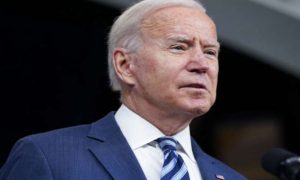On Wednesday, New York, Massachusetts and Illinois joined a growing number of US states in announcing they are ending statewide mask mandates. The changes come at a time when the Centers for Disease Control and Protection still recommends indoor masking in all areas with high COVID-19 transmission — which includes most of the country.
The omicron variant, which now accounts for nearly 100% of all COVID-19 cases in the US, prompted some states and cities to reinstitute mask mandates during the winter holiday season. As COVID-19 infections and hospitalizations drop sharply, state governments are reconsidering whether mask mandates are necessary.
Rising cases during December prompted the Biden administration to extend the federal mask mandate until March 18 in an effort to curb the spread. That mandate will not be changing — the federal requirement to wear a mask over the nose and mouth still applies to people riding the bus, train and airplanes.
The CDC continues to recommend everyone wear a face mask in crowded areas, regardless of vaccination status. In a briefing Wednesday, CDC Director Dr. Rochelle Walensky reiterated, “We continue to recommend masking in areas of high and substantial transmission — that’s much of the country right now — in public indoor settings.”
However, Walensky also stressed that the decision to require masks in schools, restaurants, bars, gyms or other businesses should be made by local governments taking into account all of the specific COVID-19 factors in their communities.
In response to a question about the discrepancy between the CDC’s recommendation and recent state decisions to end mask mandates, Walensky said, “We’ve always said that these decisions are going to have to be made at the local level and that policies at the local level will look at local cases, they’ll look at how local hospitals are doing, they’ll look at local vaccination rates … I’m really encouraged that cases are continuing to drop dramatically, hospitalizations are continuing to drop dramatically as people are making these decisions and as we are working on our guidance.”
Which states are ending mask rules?
On Wednesday, New York Governor Kathy Hochul announced that state is lifting its mask mandates for everyone starting Feb. 10. Patrons of indoor business were previously required to be vaccinated or wear masks indoors. Cities, counties and individual businesses can still opt in to the mask-or-vaccine requirement, but it’s no longer required by state law.
California’s indoor masking requirements for vaccinated people are set to expire on Feb. 15. On Monday on Twitter, Governor Gavin Newsom confirmed that the mandate would indeed end next Tuesday. Unvaccinated people will still be required to wear masks indoors. Also on Monday, Delaware Governor John Carney announced that the state’s universal mask requirement will end Feb. 11 and that the school mask requirement will end March 31.
Illinois plans to end its statewide indoor mask mandate on Feb. 28, Governor Bill Pritzer declared Wednesday. Pritzker noted that the state has seen its sharpest drop in hospitalizations since the pandemic began. Illinois Department of Public Health Director Ngozi Ezike clarified, “While masks will no longer be required in most indoor locations beginning February 28, they are still recommended.”
Also on Wednesday, Massachusetts Governor Peter Baker announced that the state’s school masking requirements would be lifted on Feb. 28. Massachusetts joins Oregon, New Jersey, Connecticut and Delaware in recently declaring end dates for masks in public schools. Fourteen states and the District of Columbia currently have mask requirements for schools, though several phase out depending on local COVID rates.
Which states currently require masks?
With New York’s mandate ending Thursday, eight states currently require masks in indoor settings like restaurants, bars and gyms:
- California
- Delaware
- Hawaii
- Illinois
- Nevada
- New Mexico
- Oregon
- Washington
As noted above, Delaware’s universal mask mandate ends Feb. 11, and Illinois’ statewide mask rules end Feb. 28.
The District of Columbia and Puerto Rico also require masks for everyone indoors, while Connecticut requires masks indoors only for unvaccinated people. As of Feb. 15, California will also only require unvaccinated people to mask indoors.
What does the CDC recommend about masking?
The current CDC guidance for mask wearing says that everyone age 2 years and older, vaccinated and unvaccinated, should continue wearing masks indoors when in public places, especially if in a high COVID-19 transmission area, to help prevent spreading the disease to others.
The CDC also says that people outdoors generally do not need to wear masks, unless they are in extended close contact with other people.
In May 2021, the CDC stated that vaccinated people did not need to wear masks anywhere, but reversed course in July when the delta variant of COVID-19 created large numbers of infections, hospitalizations and deaths.
The AARP has an excellent state-by-state rundown of mask mandates across the US.
What is the federal mask mandate?
In December, the Biden administration extended its mask mandate for those traveling by trains, buses and airplanes due to concerns around the new omicron variant. Originally intended to expire Jan. 18, the measure is now set to end March 18. The Biden administration has not said yet if it plans to extend the federal mask mandate.
What is the World Health Organization’s position on masks?
The World Health Organization currently recommends masks strongly to mitigate the spread of COVID-19. The organization’s guidance is clear in its recommendation: “Where there is community or cluster transmission of SARS-CoV-2, irrespective of vaccination status or history of prior infection, wearing a well-fitting mask that covers the nose and mouth is recommended for the public when interacting with individuals who are not members of their household.”
At the start of the COVID-19 pandemic, the WHO originally said that there was not enough evidence to support the general public wearing masks and that masks should be reserved for health care workers and those infected with COVID-19. The group changed its position in July 2020, recommending masks for everyone to reduce infections and spread of the virus.
For more information, here’s what you need to know about “long COVID” and how it’s treated. Also, read up on these COVID-19 vaccine side effects and important dos and don’ts of getting your COVID-19 vaccine.





























